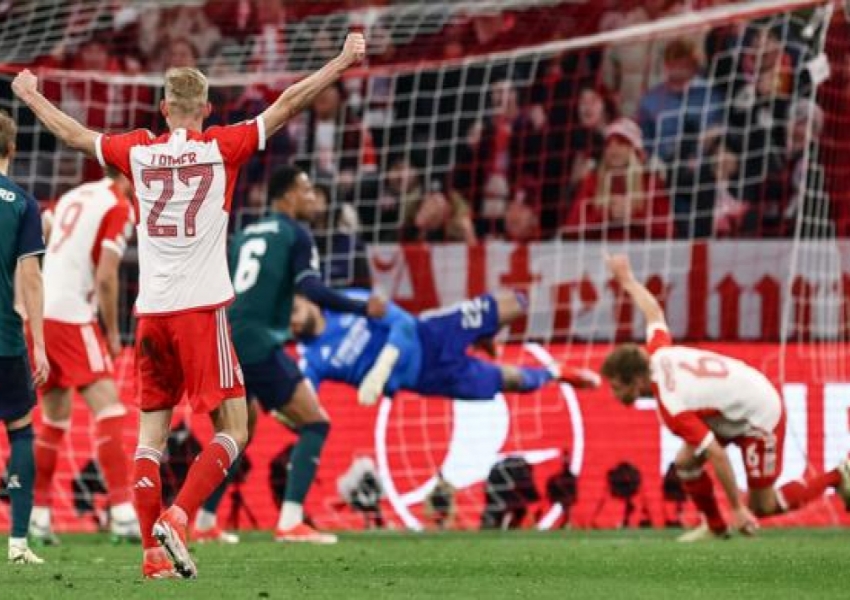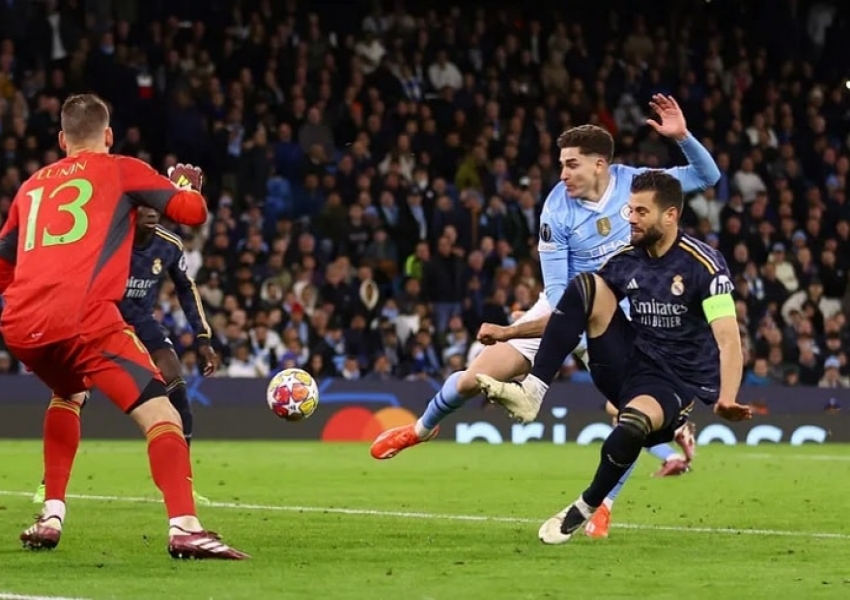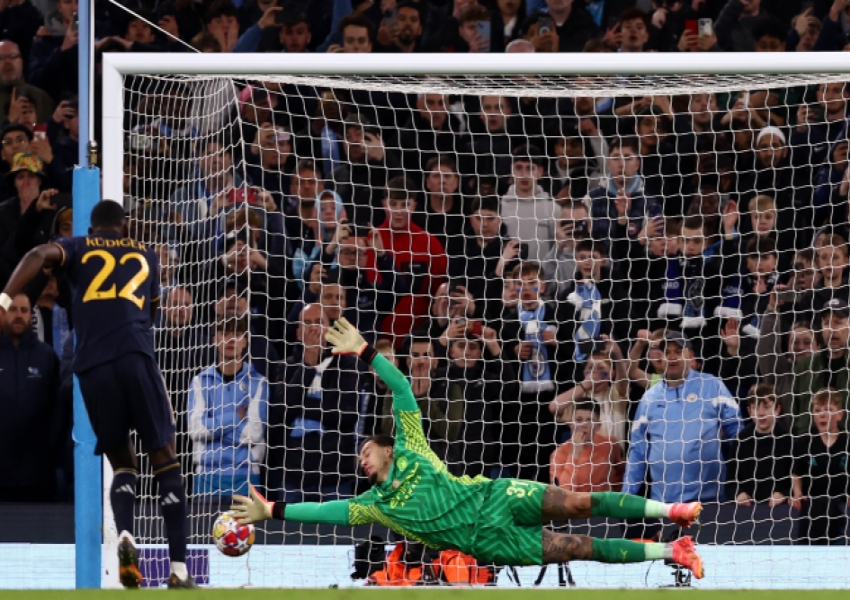Champions League Semifinal First Leg: How Much Influence Does Bayern's Coach Have? Don't Mythologize Ancelotti at Real Madrid
The Champions League quarterfinals saw Bayern Munich and Real Madrid eliminate the two strongest English teams of the season. Bayern faced a significantly improved Arsenal and played with a well-organized strategy. Despite head coach Thomas Tuchel announcing his departure at the end of the season due to heavy criticism, he continued his Champions League good fortune, guiding Bayern to the semifinals for the first time since their 2019-2020 title-winning season. In the second leg, Bayern held a slight advantage in terms of play, though Arsenal was not completely passive. This season, Bayern has been inconsistent, whereas Arsenal has been on an upward trajectory. Yet, Arsenal's poor record against Bayern made them cautious, leading to a situation where both teams seemed content with a draw.

The deadlock was broken in the 63rd minute by Joshua Kimmich, prompting Arsenal's Mikel Arteta to bring on attackers Gabriel Jesus and Leandro Trossard. Tuchel quickly responded by introducing Kim Min-jae to bolster the defense. With the situation unchanged, Arteta brought on Eddie Nketiah, while Tuchel countered with Dayot Upamecano. Bayern ultimately held onto their lead. Arsenal fans might question why Arteta didn't bring on Emile Smith Rowe to go all-in, while Bayern fans might be critical of Tuchel’s conservative approach. Some might argue that simply adding a center-back after taking the lead was too simplistic a strategy. Even if Bayern won, few fans would credit Tuchel for the victory.

In contrast, after Real Madrid eliminated Manchester City, nearly everyone praised Carlo Ancelotti's tactics and in-game management. Real Madrid’s starting lineup might be able to match City's, but in extra time, City's squad depth advantage became apparent. Ancelotti deployed a classic Italian defensive strategy and ultimately advanced through a penalty shootout. Known for his adept use of all five substitution slots, Ancelotti’s management style was key to leading an aging Real Madrid to Champions League glory. As time passed, Real Madrid has gradually become younger, and Ancelotti’s substitution strategy has evolved. For example, in 2022, Luka Modric would start crucial matches, whereas now he often comes off the bench.

In the away match against Manchester City, Ancelotti didn't make his first two substitutions until Kevin De Bruyne equalized, bringing on Modric and Brahim Diaz for Toni Kroos and Rodrygo. This decision was debatable, as City’s morale was high and Real Madrid needed stronger defense, making Modric’s introduction questionable. Unless Ancelotti aimed to regain control with these substitutions, which would be a tall order, it might not have been the best choice. Both teams were predictably cautious in extra time, and during the penalty shootout, Ancelotti’s decision to have center-backs take the fourth and fifth penalties surprised many. Fans once again marveled at his strategy, but was this Ancelotti’s initial plan? Were Valverde and Diaz less reliable penalty takers than Rudiger and Nacho? Or did the midfielders shy away from the responsibility? This arrangement was likely a forced choice rather than a masterstroke. Even with Modric missing his penalty, Real Madrid still won the shootout, showcasing the incredible luck of the Champions League giants. Of course, goalkeeper Lunin’s performance was crucial, as Real Madrid might not have reached the shootout without him, even with Courtois in goal. Last time Real Madrid won the title, they had Benzema, and now Bellingham steps up. He is expected to help Real Madrid play to their potential, while Kane will lead Bayern to a competitive level at home.
Bayern Munich’s Quarterfinal Journey: Tactical Discipline and Defensive Solidity
Bayern Munich's quarterfinal success against Arsenal highlighted their tactical discipline and defensive solidity. Under Tuchel, Bayern maintained a structured approach, crucial for navigating a challenging tie against a resurgent Arsenal. Despite criticism and the looming departure of their coach, Bayern's experience and resilience shone through.
In the second leg, Bayern's slight dominance was evident, yet they approached the game cautiously. The strategy paid off when Kimmich broke the deadlock, forcing Arsenal to chase the game. Tuchel’s response to Arsenal’s offensive changes was swift, introducing defensive reinforcements to preserve their lead. This conservative yet effective game management ensured Bayern’s progression to the semifinals, showcasing Tuchel's ability to navigate high-stakes matches despite external pressures.
Real Madrid’s Tactical Masterclass: Ancelotti’s Adaptability and Strategic Ingenuity
Real Madrid’s elimination of Manchester City was a testament to Carlo Ancelotti’s tactical masterclass. Facing a team with superior squad depth, Ancelotti’s strategic adaptability and in-game management were pivotal. Real Madrid’s defensive resilience, particularly in extra time, exemplified classic Italian defensive tactics, effectively neutralizing City’s attacking threat.
Ancelotti’s substitutions played a crucial role in managing the game’s dynamics. Bringing on experienced players like Modric at critical junctures aimed to regain control and stabilize the team. Despite the debate over the timing and nature of these substitutions, Ancelotti’s decisions ultimately contributed to Real Madrid’s ability to take the match to a penalty shootout. His innovative choice of penalty takers, albeit surprising, highlighted his trust in the defensive solidity and mental fortitude of his players.
Comparing Coaching Philosophies: Tuchel’s Pragmatism vs. Ancelotti’s Strategic Ingenuity
The contrasting coaching philosophies of Tuchel and Ancelotti provide a fascinating narrative. Tuchel’s pragmatism, characterized by structured defensive play and tactical discipline, contrasts with Ancelotti’s strategic ingenuity and adaptability. Tuchel’s approach, while effective, often prioritizes defensive solidity over expansive play, reflecting his cautious and methodical style.
In contrast, Ancelotti’s ability to adapt his tactics to the game’s flow and his innovative use of substitutions exemplify his strategic genius. His approach balances defensive resilience with attacking fluidity, allowing Real Madrid to navigate complex matches and emerge victorious. This adaptability and willingness to take calculated risks underscore Ancelotti’s reputation as a master tactician.
The Semi-Final Showdown: Tactical Expectations and Key Players
As Bayern Munich and Real Madrid prepare for their semifinal clash, tactical expectations and key players will significantly influence the outcome. Bayern, under Tuchel, is likely to emphasize defensive organization and structured play, seeking to capitalize on counter-attacking opportunities. Key players like Joshua Kimmich and Thomas Müller will be crucial in orchestrating Bayern’s midfield and creating scoring chances.
Real Madrid, guided by Ancelotti, will focus on maintaining tactical flexibility and leveraging their attacking prowess. Jude Bellingham’s role in driving the midfield and creating goal-scoring opportunities will be vital. Ancelotti’s strategic use of substitutions and ability to adapt to the game’s dynamics will also play a crucial role in determining Real Madrid’s performance.
Predicting the Outcome: Tactical Battles and Individual Brilliance
The semifinal clash between Bayern Munich and Real Madrid promises a tactical battle and showcases individual brilliance. Bayern’s structured approach and defensive solidity, combined with Real Madrid’s tactical adaptability and attacking fluidity, will create an intriguing contest.
Bayern’s ability to maintain defensive discipline and capitalize on counter-attacks will be critical. Meanwhile, Real Madrid’s focus on leveraging their attacking strengths and Ancelotti’s strategic substitutions will be pivotal in breaking down Bayern’s defense. The outcome may hinge on key moments of individual brilliance from players like Kimmich, Müller, Bellingham, and Kane, who are expected to influence the game significantly.
Conclusion: Tactical Mastery and Strategic Brilliance
The Champions League semifinal between Bayern Munich and Real Madrid is set to be a captivating encounter, showcasing tactical mastery and strategic brilliance. Tuchel’s pragmatic approach and Ancelotti’s innovative tactics will provide a fascinating narrative, highlighting the contrasting coaching philosophies. As the teams prepare for this crucial clash, the tactical battles and individual performances will be central to determining the outcome, promising an enthralling spectacle for football fans worldwide.
Copyright Statement:
Author: mrfootballer
Source: Mrfootballer
The copyright of this article belongs to the author. Reproduction is not allowed without permission.
Recommended Blog
- Ligue 2 Matchday 37: Is Saint-Étienne’s Improvement Too Late? Auxerre’s Tactical Superiority Shines
- Europa League Semifinals Second Leg: Roma’s Aerial Ambitions and Marseille’s Desperate Pursuit of Glory
- Copa Libertadores Group Stage Round Four: Botafogo Gaining Experience, Ferroviarios Aiming for Early Qualification
- Champions League Semi-Finals Second Leg: PSG's Composure and Courtois' Crucial Return for Real Madrid
- J-League Round 12: Hiroshima’s Lone Unbeaten Record and Kashiwa’s Offensive Struggles
- Serie A Round 35: Roma’s Defensive Strength, AC Milan’s Off-Field Concerns
- A-League Playoff First Round: Does Sydney FC Really Have Home Advantage? Melbourne Derby Relies on Veterans
- J1 League Round 11: Nagoya Grampus Welcomes Back Ha Chang-rae, Cerezo Osaka - The Weakest Leader?
- Europa League Semifinals First Leg: Are Leverkusen Running on Empty? Has Atalanta’s Challenge Weakened?
- K League Round 10: Ulsan Hyundai Focuses on Image, Jeonbuk Hyundai Needs to Improve Focus
Hot Blog
- Champions League Quarterfinals Set: Arsenal Crush PSV 9-3, Villa Dominate Brugge 6-1! Real Madrid vs. Arsenal Confirmed
- Champions League Drama: Rare Penalty Violation! VAR’s Eagle Eye Turns 60,000 Cheers to Silence
- Vinícius Jr. Misses Crucial Penalty as Atlético Fans Erupt – Bellingham Offers Consolation in Madrid Derby Thriller
- Champions League Quarterfinals Set to Take Shape – Arsenal and Villa Poised to Advance, Real Madrid in Strong Position, Dortmund Facing an Uphill Battle
- Real Madrid Survive Atlético Thriller: Win 4-2 on Penalties to Set Up Quarterfinal Clash with Arsenal
- 1-4! 0-4! A Dark 24 Hours for Chinese Football – Shanghai’s Giants Humiliated and Eliminated from the AFC Champions League
- 4 AM Showdown: Manchester United’s Do-or-Die Battle – Defeat Means Elimination and a Trophyless Season
- Man City’s 21-Year-Old Star Returns Home as a Hero! Receives $350,000 Mercedes, Gifts It to His Father
- AFC Champions League Quarterfinal Draw: Yokohama Faces CR7! Two High-Stakes Clashes as Japan’s Duo Battle in the Bottom Half
- Barça Unleashed: 26-Minute, 4-Goal Comeback Stuns Atlético as Flick’s Masterclass Makes History